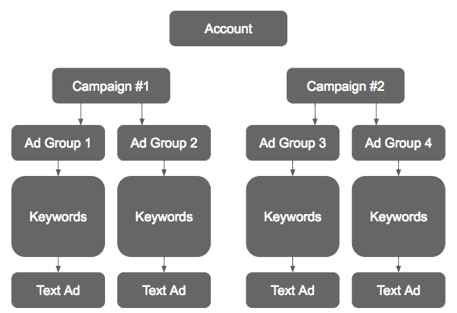Very few brands have become a part of our vernacular. When consumers want to find an answer to a question or find a service or a product, they simply “Google it.” That’s why it’s more important than ever for your business to show up in the results. With Google Adwords, you can ensure you appear and show up at the top of the page for specific searches.
How does Adwords work?
Adwords is the service Google offers that allows a website to appear on Google search pages and websites within the Google network. The main offering, Google Adwords Search, allows you to show a text-based ad on a results page when someone conducts a search using a keyword in a phrase or question. Each text-based ad is tied to these keywords and shows up in the top and bottom spots on every page. These are the listings that have the green “Ad” in a box next to the web address in the listing.

A typical Adwords account is broken into campaigns that contain groups of keywords that are tied to the same ad. Often, these campaigns are separated by services/products that allow an advertiser to organize them into themed groups. (See figure 1.)
Adwords is referred to as pay-per-click marketing because it’s an auction-style system where you only pay when someone clicks on your ad. Where your ad appears is determined equally by how much you pay Google for each click and how relevant your ad is to what the searcher is seeking. This is done so that a big company cannot simply buy a top spot for a search without being relevant to the user.
Keywords and search queries
Keywords are the lifeblood of a good Adwords campaign and can mean the difference between success and failure. Think of keywords as the root words in a consumer’s search query. (See figure 2.) Google knows that you can’t think of every possible combination that a consumer would use, so it allows you to bid on the keyword or phrase within the search query. For example, a landscaper may bid on the keyword, patio installation. When bidding on this keyword, your ad would show for the following search queries: “How much does a patio installation cost?,” “Patio installation companies near me,” “DIY patio installation” and “Belgard patio installation companies in Cleveland.”

Since the keyword patio installation is contained in all of these search queries, your ad would show up in the results. More than likely, the third search query, “DIY patio installation,” would not be something you would want to show an ad for. That’s why it’s important to use longer keywords and negative keywords to help control which search queries trigger your ads. This helps keep your ad relevant to what the user is searching, which saves you from having to bid more money on each click. It also helps you control paying for clicks from consumers who can’t use your products or services.
For example, if we bid on the keywords “patio installation companies” and “patio installation cost,” we would avoid that third search query from the consumer looking for a DIY project. We also could bid on the keyword patio installation and list a negative keyword, “DIY,” to prevent our ad from showing for the third search query.
Finding great keywords
Now comes the hard part: creating a list of keywords to bid on. It’s best to start with a list of the main words for your products and services. That list may look something like this: patio install, mowing, snow plowing, landscaping and sprinkler systems.
After creating your list, start typing each into Google’s search box, which will trigger the autosuggestion feature, providing you with common searches performed by others. For additional keywords, click on each keyword in the autosuggest and scroll to the bottom. This will provide you with searches related to each keyword that can help you further round out your list.
Stay tuned for part 2 in the January issue, covering how to write winning ads and more.

